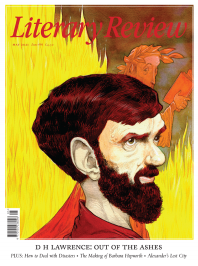Caroline Moorehead
Green-Fingered Emperor
Napoleon: A Life in Gardens and Shadows
By Ruth Scurr
Chatto & Windus 400pp £30
Among the Bonapartes, gardens are more often associated with Josephine, whose greenhouses and plants at Malmaison became famous throughout the world, than with Napoleon. But, as Ruth Scurr writes, from a very young age the future emperor used gardens as a retreat from the frustrations of powerlessness, while on St Helena they provided him with rare privacy from prying British guards. In between, though he had little time for actual gardening, he maintained a steady interest in the natural world in all its forms, collecting, planning and inspiring others. Napoleon: A Life in Gardens and Shadows is history at its most enjoyable, a discursive ramble along its edges, away from matters of power and into its byways.
Napoleon’s school days in Brienne-le-Château are best known from the snowball fight in Abel Gance’s remarkable six-hour film Napoléon. Less well known is that during this time he found refuge in a small allotment no larger than a grave, though he soon took over his schoolfellows’ adjoining plots. Here, legend has it, he created an arbour, a green sanctuary where he could read and be alone.
The Jardin des Plantes on the left bank of the Seine in Paris had started in the mid-17th century as a nursery for medicinal plants and it remained a natural enclave through the revolution, when it became home to exotic birds and animals ousted from aristocratic menageries. As Napoleon embarked

Sign Up to our newsletter
Receive free articles, highlights from the archive, news, details of prizes, and much more.@Lit_Review
Follow Literary Review on Twitter
Twitter Feed
Under its longest-serving editor, Graydon Carter, Vanity Fair was that rare thing – a New York society magazine that published serious journalism.
@PeterPeteryork looks at what Carter got right.
Peter York - Deluxe Editions
Peter York: Deluxe Editions - When the Going Was Good: An Editor’s Adventures During the Last Golden Age of Magazines by Graydon Carter
literaryreview.co.uk
Henry James returned to America in 1904 with three objectives: to see his brother William, to deliver a series of lectures on Balzac, and to gather material for a pair of books about modern America.
Peter Rose follows James out west.
Peter Rose - The Restless Analyst
Peter Rose: The Restless Analyst - Henry James Comes Home: Rediscovering America in the Gilded Age by Peter Brooks...
literaryreview.co.uk
Vladimir Putin served his apprenticeship in the KGB toward the end of the Cold War, a period during which Western societies were infiltrated by so-called 'illegals'.
Piers Brendon examines how the culture of Soviet spycraft shaped his thinking.
Piers Brendon - Tinker, Tailor, Sleeper, Troll
Piers Brendon: Tinker, Tailor, Sleeper, Troll - The Illegals: Russia’s Most Audacious Spies and the Plot to Infiltrate the West by Shaun Walker
literaryreview.co.uk